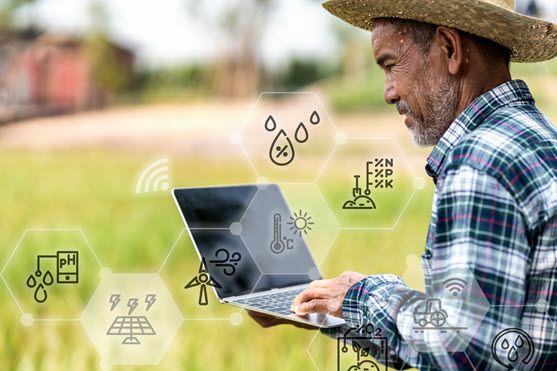Empowering smallholder farmers: Leveraging Big Data and technology for gricultural advancement
Dr. Jean-Marcel Ribaut
02 February 2022
The Integrated Breeding Platform
Hello, my name is Jean-Marcel Ribaut and I am Director of the Integrated Breeding Platform (IBP). We have been working with VSNi for almost 10 years on the development and distribution of data management software known as the Breeding Management System (BMS), a software suite specifically designed to help plant breeders manage day-to-day activities through all phases of their breeding programmes. The BMS helps breeders conduct their routine activities with more efficiency, so that they can develop improved cultivars faster and at lower costs; it combines information management, data analysis and decision-support tools that accommodate common breeding schemes. The BMS is important in the demand-led breeding approach, however, it is also part of a broader landscape that includes farming practices and seed distribution that are common bottlenecks along the crop value chain; it is this unifying approach that brings me to the subject of today’s blog: How can smallholder farmers benefit from advances in technology and access to big data?
Before going further, it is important to clarify that farmers are not going to access big data directly and nor do they have an interest in it; they want the knowledge and information that may be extrapolated from the big data and, thanks to the ready availability and low cost of smart phones and other digital technologies, they have the means by which they can use the output of big data analysis and machine learning approaches.
Why smallholder farmers?
Smallholder agriculture is the backbone of many developing country economies, both in terms of food production and employment. Recent studies have shown that about 500 million smallholder farming households globally account for one-third of total food production. This is significant at several levels and good reason to apply the latest tools in data and technology to support smallholder producers. There is considerable potential for smallholder producers to increase their production and incomes while maintaining their environment and meeting the demands of newly emerging markets. A perfect storm, but in a nice way!
An holistic approach is needed
The IBP has focused on data management for the development of new crop cultivars; plant breeding has been our take-off point. However, we have come to realise that new cultivars, per se, are not going to change the livelihoods of smallholder farmers in the absence of an enabling environment that will include data and information about new cultivars, the availability and cost of seed, good agricultural practices and access to markets. Therefore, we are broadening the original focus on plant breeders to adopt a more holistic or value chain approach to the development, distribution and utilisation of new cultivars. In doing so, we place smallholder farmers at the centre of this new paradigm: their engagement and ownership of the process is vital. With it comes the foundations of a sustainable business model that may be scaled out geographically and across commodities.
Empowering farmers with actionable insights
The inputs needed by smallholder farmers include not just seed, fertiliser and other physical inputs but also advice, and it is here that the power of large databases and information and communication technologies becomes more obvious. Increasingly, farmers need to make predictions about their crops and inputs and this is where new and powerful algorithms and artificial intelligence can be combined, together with vast amounts of data to answer the questions they want to ask.
It is a paradigm shift to go from posing a question and then collecting the data to accessing huge datasets with modern tools and formulating the question.
For example, geo-located data about crop development and weather conditions, collected during the crop cycle, can be used immediately to inform the future development of varieties and optimize management practices to maximize harvest. Climate change is happening and climate resilience will take many shapes and forms, including the ability for smallholder farmers to pre-empt future rainfall and temperature patterns and to optimise their requirements for the judicious use of pesticides and fertiliser = Green Agriculture. Similarly, with urbanisation and other demographic changes across developing countries there is an associated shift in market demands. The ability of smallholder farmers to respond to these demands, armed with the best available knowledge and information will be paramount in their quest for improved livelihoods and sustainability.
About the author
Jean-Marcel holds a PhD in Plant Physiology from Lausanne University, Switzerland. His scientific background is in plant physiology and genetics. Jean-Marcel was first the Director of the CGIAR Generation Challenge Program (GCP), where he was responsible for leading and coordinating a large international network of partners in modern crop breeding for food security (2005-2015). Born of the GCP, the IBP went on to become an in dependent non-profit, and Jean-Marcel has taken on the role of IBP Director ever since. Having accumulated experience in agriculture biotechnology, bioinformatics, and plant science, as well as leadership skills for dispersed global R&D teams, he has a particular interest in promoting modern technologies to hasten crop improvement and seed production in the developing world. Jean-Marcel's underlying motivation is to help weave effective and interactive communities of crop researchers to bridge the gap between basic and applied agricultural science. He believes in true partnership and solid capacity building to overcome the bottlenecks in R4D, working with developing-country partners as key actors to lead the research arena and empower a culture of change.
Popular
Related Reads
